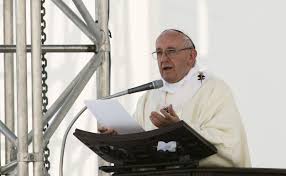Is Pope Francis a heretic? So claims the recent letter, signed by various theological luminaries of various stripes, including, to my surprise, the Dominican priest, Father Aidan Nichols, whose sharp mind, I would have thought, might have seen through the limitations of this radical claim.
The thing about heresy, as a canonical crime, is that the false principle must be public, manifest, clear and held with some degree of determination. Here is the definition from the current Code of Canon Law (#751):
Heresy is the obstinate denial or obstinate doubt after the reception of baptism of some truth which is to be believed by divine and Catholic faith.
The Holy Father’s internal forum – that is, his conscience – is between him and God, intermediated by his confessor and spiritual director. What we have a duty to assess are his public pronouncements, especially his authoritative ones, and whether any of these constitute such an ‘obstinate denial’ of a divinely revealed truth. Nowhere, as far as this writer has read, has Pope Francis done this, even if some of what he has said and written – or at least, promulgated under his authority and name – is dangerously ambiguous, and perhaps even propaedeutic to some of the heretical claims made. As examples, that man cannot live, or live well, without conjugal relations; that certain commandments are impossible to keep under certain conditions; that a marriage may be nullified in the internal forum; that Communion may be received even while committing what constitutes ‘grave sin’; and so on.
But nowhere has the Holy Father explicitly and obstinately made these claims. In fact – although I have deep reservations about certain statements he has made, and this is not meant as a pro-Francis apologia – most of his writing and pronouncements are in the opposite direction, even in Chapter 8 of Amoris, reaffirming the traditional teaching of the Church, even if in more muted, ambiguous and even confusing terms than is befitting.
One might think, even argue, that all the pious and orthodox statements a ‘foil’ to deflect from his ‘true’ intentions. Only God knows that for certain, and the nineteen signers of the letter (update: the number has now been signed by 12 others, bringing the number to 31) seem to have overplayed their hand, which may play into the very hands of those may indeed have nefarious intentions. For what will now happen if actual heresy is explicitly promulgated, which would hardly need twenty pages of ‘proof’? Would not one line of indisputable text suffice? Will this be a case of crying wolf? I for one fear they have played their hand too early and too precipitously.
Regardless, we as Catholics follow primarily not the Pope, but the Christ and His Church. Whatever a given Pontiff teaches writes or opines – to say nothing of various cardinals (German or otherwise), bishops, synods – should always, always be interpreted with the traditional teaching of the Church, with all the two millennia of Magisteria that came before him, with the clear, definitive and authoritative ‘deposit of Faith’ that constitutes what we must believe and live out to gain heaven, which those with eyes to see and ears to hear and a mind to think will always be able to find.
As I have written before, this seems the reason God gave us the vast corpus of theological precision in the teachings of Popes John Paul and Benedict, and we may add Piuses IX – XII, and on back in time, prior to the reign of Francis; it’s all there, and quite easy to find, and not all that difficult to read.
Popes come and go, back to the dust whence they came, but Christ and His Truth stand forever, for those who ask and seek.










